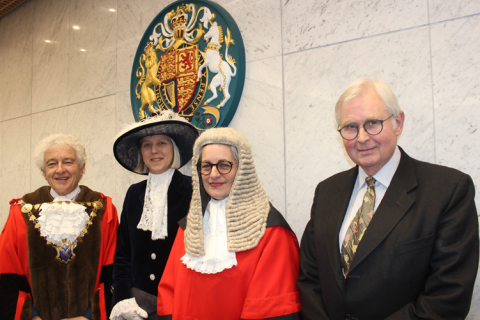Landlords
Landlord's Forum
Landlord's Forum – 26th June 2024
The Council organises a Landlord’s Forum as an opportunity for private landlords and lettings agents to:
- Learn about new legislation
- Receive information and advice from guest speakers
- Discuss housing matters with Council officers from Private Sector Housing, Mosaic Lettings, and more, including the NRLA (National Residential Landlords Association)
To find out more information and to register to attend please visit our webpage: www.stalbans.gov.uk/landlord-forum
Rent and housing benefit
Rent – The Local Housing Allowance (LHA) rate Toggle accordion
Should your tenant receive benefits towards paying rent, we recommend that as a landlord you set the rent as close to the LHA rate as possible. This makes the property affordable for your tenant. It also decreases the possibility of the tenant facing financial difficulties including unpaid rent to yourself.
You can check the LHA rate for your property at:
Rent benefit payments Toggle accordion
Once the tenancy has been signed, eligible tenants should make an application for Housing Benefit or Universal Credit Housing Support to set up their benefit payments. Benefit assessments can take 4-6 weeks to process, and the rent benefit payments for tenancies will be backdated to the start date of the tenancy. These benefits are paid 4 weekly in arrears.
Keeping rent statements Toggle accordion
As a landlord we recommend you keep a track of your rental payments, whether owed or received. It is good practice to supply your tenant with a statement every 6 months so they are aware of their rent payments.
Safety regulations and certificates
Damp and Mould in the Home Toggle accordion
The Government has issued guidance relating to Damp and Mould in the home.
This guidance makes clear, tenants should not be blamed for damp and mould. Damp and mould in the home are not the result of ‘lifestyle choices’, and it is the responsibility of landlords to identify and address the underlying causes of the problem, such as structural issues or inadequate ventilation.
The guidance can be found on the Government website Understanding and addressing the health risks of damp and mould in the home
Electrical Safety Standards in the Private Rented Sector Regulations 2020 Toggle accordion
The Electrical Safety Standards in the Private Rented Sector (England) Regulations 2020 make it compulsory for landlords to have the electrical installations in their properties inspected and tested by a qualified electrician at least once every five years (or sooner if recommended by the electrician) and to keep a copy of the inspection report.
This report must be provided to a tenant before occupancy, to any current tenant within 28 days of the test, and to the Council if requested.
Where further investigation or remedial works are required by the report this must be carried out within 28 days of obtaining the report (or a lesser period if specified in the report). Landlords must provide written confirmation, from the electrician, that the work has been completed, along with the original inspection report, to each tenant and to the Council within 28 days.
If the Council requests a copy of the inspection report, it must be provided within 7 days.
Where inspection reports are required to be sent to the Council or have been requested by the Council these should be sent to the Private Sector Housing Team at privatesectorhousing@stalbans.gov.uk.
Failure to comply with the regulations could lead to further action and a fine of up to £30,000 per offence.
More information and guidance on the regulations can be found at:
Information on electrical safety and finding a qualified electrician can be found at:
https://www.electricalsafetyfirst.org.uk/find-an-electrician/
Gas safety - Certificates, checks and responsibilities Toggle accordion
Landlords are legally responsible for ensuring the gas appliances in their properties are safe and fit for purpose. As a Landlord, you have 3 main responsibilities:
Maintenance – you must ensure that gas appliances are maintained and kept safe for use.
Gas safety checks – an annual gas safety check must be carried out on every gas appliance.
Record keeping – you must provide a record of the annual gas safety certificate to your tenant within 28 days of the check, or to new tenants before they move in to the property. You must keep your gas safety records for 2 years. These checks must be carried out by a registered Gas Safe engineer.
Further guidance on landlords' responsibility for gas safety is available on the HSE website: https://www.hse.gov.uk/gas/landlords
The Electrical Equipment (Safety) Regulations 1994 Toggle accordion
Electrical supply and any appliances you supply within your property must be safe. We recommend that you inspect electrical appliances annually and keep a record of the checks that you carry out. Smoke alarms should also be fitted in all let properties and checked regularly to make sure they are in full working order.
The Plugs and Sockets (Safety) Regulations 1994 (Consumer Protection Act 1987) Toggle accordion
Any plugs, sockets and adaptors that you supply in your property must comply with the appropriate current regulations.
Smoke and Carbon Monoxide Alarm Requirements Toggle accordion
The Smoke and Carbon Monoxide Alarm (Amendment) Regulations 2022 are now law.
The regulations will come into force on 1 October 2022 and landlords must be compliant with the requirements set out in the Regulations from that date.
These new regulations mean that:
- All landlords must ensure at least one smoke alarm is provided on each storey of their homes where there is a room used as living accommodation. This has been a legal requirement in the private rented sector since 2015.
- All landlords must ensure a carbon monoxide alarm is provided in any room used as living accommodation which contains a fixed combustion appliance (excluding gas cookers). A fixed combustion appliance means a fixed apparatus where fuel of any type is burned to generate heat.
- All landlords will be legally obligated to ensure smoke alarms and carbon monoxide alarms are repaired or replaced once they are informed and the alarms are found to be faulty.
These regulations are in place to ensure private and social tenants are safe in their homes. Any landlord found to be in breach could be fined up to £5,000.
More information can be found on the Government website Smoke and Carbon Monoxide Regulations 2022: guidance for landlords and tenants.
The Furniture and Furnishings (Fire) (Safety) Regulations 1988 Toggle accordion
It is an offence to install any furniture in let properties which does not comply with the regulations. Furniture with stuffing, springs, cushions and covering fabric must have fire resistant filling material and pass a cigarette resistance test. Labelling on furniture will often confirm compliance with these regulations.
Energy Performance Certificate (EPC) Toggle accordion
Landlords must provide a valid EPC when they let a property. The EPC is valid for 10 years and may be reused for as many times as required until it expires. The EPC provides a rating for the energy performance of your property. This rating ranges from A to G, where A is very efficient. All properties let by private sector landlords will need to have an EPC rating of E or above – some exceptions do apply.
See domestic private rented property minimum energy efficiency standard landlord guidance for more information.
Registering domestic appliances - landlords and letting agents Toggle accordion
Occasionally, faults are identified that require a product recall or a modification to ensure that the appliance does not present a fire risk. However, it can be very difficult for manufacturers to trace affected products and alert users to the risks posed if their contact details were not recorded at the time of purchase, or soon afterwards by the owner registering the product. This is a particular problem if appliances are purchased second-hand or go through multiple users in their lifetime, such as those provided in rented accommodation.
By taking some simple measures, landlords and letting agents can be sure that they are supplying safe appliances and will be notified of any product recalls, providing peace of mind for the safety of their tenants and property portfolio. Further information and best practice advice has been made available online at: www.hertfordshire.gov.uk/registermyappliance.
Tenancies and notices
Assured Shorthold Tenancies (AST) and periodic tenancies Toggle accordion
The AST determines how much rent the tenant will pay. It will state how long the tenancy lasts, and who is responsible for repairs.
Guidance on Assured Shorthold Tenancies can be found at:
https://www.gov.uk/tenancy-agreements-a-guide-for-landlords/tenancy-types
End of the fixed term Toggle accordion
After the initial fixed term, the landlord and tenant have the opportunity to renew the fixed term period. If not renewed, then the tenancy will become ongoing (periodic) until either landlord or tenant serves a notice of termination.
Ending a tenancy Toggle accordion
You must follow strict procedures if you want your tenant to leave your property. For information on ending tenancies, please see: www.gov.uk/evicting-tenants
Tenancy deposit protection schemes and landlords Toggle accordion
Landlords must place their tenants’ deposit in a tenancy deposit protection (TDP) scheme if they rent out their property on an assured shorthold tenancy that started after 6 April 2007.
Details of the tenancy deposit schemes that are available and landlord's responsibilities are available at:
Further information
Government guidance Toggle accordion
- Renting out your property - A website providing information for landlords on their responsibilities when renting out properties
- The How To Let guide
This guide is for current and prospective landlords. It explains the responsibilities, legal requirements and best practice for letting a property in the private rented sector. It is not intended to cover leasehold, holiday lets or ‘resident landlords’ who let to lodgers. The Guide For Landlords: Homes (Fitness For Human Habitation) Act 2018
This document provides guidance and advice to landlords of domestic rented properties about the minimum standards required to let domestic property under the Homes (Fitness for Human Habitation) Act 2018.The Housing Health & Safety Rating System (HHSRS): guidance for landlords and property-related professionals.
The Housing Health & Safety Rating System (HHSRS) is a risk-based evaluation tool to help local authorities identify and protect against potential risks and hazards to health and safety from any deficiencies identified in dwellings. It was introduced under the Housing Act 2004 and applies to residential properties in England and Wales. This guidance is aimed at non-specialists, in particular private landlords, to help them understand the requirements under the Housing Act [2004] and help them identify the type of work that is needed on their properties to conform with the HHSRS.Understanding and addressing the health risks of damp and mould in the home - Guidance to ensure that social and private sector landlords have a thorough understanding of their legal responsibilities, and of the serious health risks that damp and mould pose.
Hertfordshire’s Better Business for All partnership Toggle accordion
Hertfordshire’s Better Business for All partnership has produced a guide for landlords.
External links Toggle accordion
Do you have a property to let?
Here at St Albans City & District Council we have our own internal lettings service, called Mosaic Lettings.
















